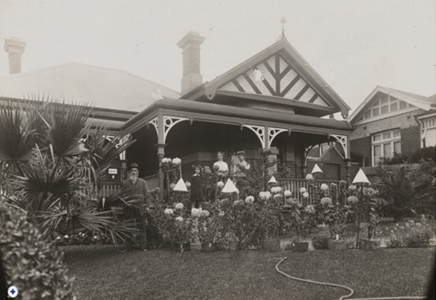The Challenge of Watering Gardens
George Hayman and family outside his Mt Lawley home with a beautiful garden at 49 Clotilde St in 1919, with his watering hose front and centre on the lawn.
Photograph, BA533/151, State Library of Western Australia
Early settlers in the Swan River Colony were constantly being plagued by the generally arid character of their soil, and by 1895 they had begun to self-identify as “sandgropers”. But nevertheless, in Perth the emphasis was on producing gardens that formed a contrast between the town and the surrounding “wilderness,” something that continued long beyond the “pioneering” period. These inviting green lawns and lush gardens were an important marker of urban development. But by 1921, people were seen watering their lawns after 11 p.m., being one of the only times when a sufficient water supply was available to do so. At this point, demand had once again exceeded the supply of water, and some areas were without any water for days. And yet Perth’s lawnscapes were vigorously defended, and hoses played a significant role in enabling hand-watering during summer so the gardens could flourish in an otherwise hot and dry climate.
Two newspaper articles appeared in 1924 which illustrate some of the challenges faced in maintaining well-watered gardens:
Sunday Times. Sunday, 3 February, 1924 Page 4
The Midnight Vigil. A Mount Lawley Mystery
“Gnome”
It was nearly midnight -when I was awakened by the ringing of the telephone. It was a neighbour calling me to say that a lady friend in a nearby street had rung to let her know that a man was watching her house, and as her husband was away, she and her children were without protection, and would I come round with him and investigate.
Dressing hurriedly, I met my neighbour and we hastened round to the house indicated. The door was opened by a very distressed lady, who explained that the adjoining house had been vacant for months, and there was a man in the grounds. She had seen him plainly when shutting her dining-room window as the light shone on him. She switched off the light and watched.
Yes, he was certainly watching the house. He stood for some considerable time on the lawn looking straight at her house. Then with stealthy steps he walked to the back and peered over her fence. Again, he stood on the lawn and surveyed the house, then walked noiselessly to the front and again looked over the fence.
What object could he have other than robbery? And probably he knew that she and her children were unprotected. She watched him for an hour, and all the time he moved backwards and forwards with stealthy steps, but never going far away from the dividing fence. She had not seen him since she rang the 'phone, but she was sure he was still there.
Like the lady, we were puzzled to know what a man in his right senses was doing in the grounds of a vacant house at midnight. Was he mad? We had just read the account of five people peacefully resting in the Botanical Gardens, Melbourne, being shot by a demented person! However, the matter had to be investigated, and screwing up our fast diminishing courage, we walked boldly to the gate of the vacant house. The moon had just risen, and we could see a front window open. Yes, it must be a burglar!
Tip-toeing across the lawn, we peered into the window. Nothing there. My friend requested me to remain in front and watch while he investigated at the back. Oh. brave man! And how I hated being left alone.
Presently I heard my friend exclaim, "What are you doing there?"
I rushed round, expecting to find my friend in holds with the mad man, and was just in time to see a very drowsy though somewhat astonished man upending himself from the lawn.
"What am I doing here," said the stranger. "I might ask you that question, seeing that I am on my own property."
Explanations were soon forthcoming. Perth's inadequate water supply was wholly responsible.
The owner, noticing the lawns of his unoccupied property were dying, and failing to get any water in the day-time, was spending the "witching hours of midnight." when a trickle of water is obtainable on some of the high parts of Perth, in trying to revive the perishing grass.
"Yes, he had looked over his neighbour's fence - to see if their hose was on."
"He had certainly moved about quietly, not wishing to disturb his neighbours."
The second story appeared in The West Australian.
Thursday, 27 March, 1924 Page 6
Careless Suburbanites
One of the greatest obstacles that meet the efforts of the detectives and the police force in combating petty thefts is the general carelessness of the average suburban resident.
The man of the house comes home in the afternoon, and does his work about the front garden and, on finishing, leaves the hose and garden tools lying about indiscriminately, often very close to the front gate.
The wife, on her part, sometimes leaves the washing out all night and the clothes, to use a well-known police phrase, are “snow dropped”, and the gardening implements are “lifted”. If both parties only displayed ordinary caution, and removed the temptation, much of the work of the Police Department would be avoided.
Yesterday Inspector Condon was rather annoyed when he announced that another case of hose stealing had been reported. He said that between 9.30 p.m. on Tuesday and 4.15 a.m. on Wednesday, a 60 feet length of practically new hose, which had been left lying on the lawn, had been stolen from a house in Mount Lawley, and he desired to issue a warning to householders not to leave portable garden articles lying about.

